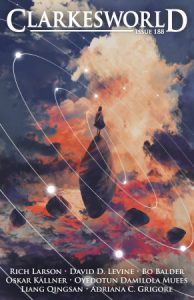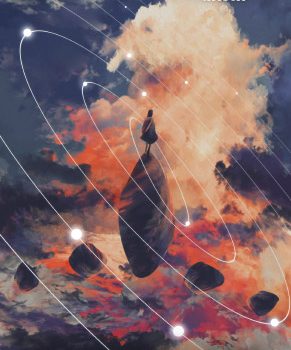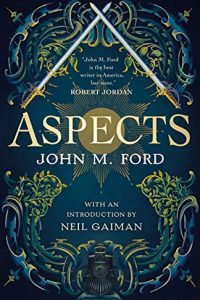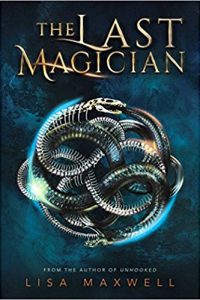Karen Burnham Reviews Short Fiction: Clarkesworld, The Sunday Morning Transport, and Future Tense
 Clarkesworld 5/22
Clarkesworld 5/22
The Sunday Morning Transport 5/22
Future Tense 4/22
Two of my favorite stories in Clarkesworld for May are translated. “The Possibly Brief Life of Guang Hansheng” by Liang Qingsan (translated by Andy Dudak) features a rather melancholy narrator who becomes obsessed with an early science fiction author, Guang Hansheng, after seeing a snippet of his work in a museum. He begins a course of obsessive research, haunting the microfiche section of the library, trying to both find all the pieces of the serialized story and build up a portrait of the obscure author. Then “Gamma” by Oskar Källner (translated by Gordon James Jones) imagines creatures orbiting a black hole during the heat death of the universe. Diving down every so often to gain energy from the Hawking radiation, they still manage to have politics and wars. We follow Gamma and Kthelk’than as they break away to see if there’s anything else they can discover in the ruins of galactic-spanning civilizations. The descriptions, as in McDaniel’s story above, gesture at a Stapledonian reach of space and time. I also enjoyed “A Manual on Different Options of How to Bring A Loved One to Life” by Oyedotun Damilola Muees. It’s a cyberpunk story, where Harafat’s sister Azeezat was incapacitated and left body-less. Harafat goes through the criminal underworld to get enough prosthetics to re-embody her sister, and of course gets caught up in a criminal enterprise. The ending was not what I was expecting, and I really liked it. A more haunting story is “Tea Parties Around Nebula-55” by Adrianna C. Grigore. We meet a guide robot, Remi, who appears to be caring for a group of children on a spaceship that is slowly falling apart. It’s a tough position to be in, and we can easily sympathize with Remi trying to keep the children happy while doing the best they can with what they have left. The real mystery, though, is why they’re in this situation, and Grigore paces the reveal quite well.
The Sunday Morning Transport weekly newsletter continues to bring excellent fiction to your inbox. “Barnacles” by Cassandra Rose Clarke imagines a world where the Seawall is supposed to be an impassable barrier keeping monsters away from the city. But one family has built their home on the Seawall, and after her mother’s death a woman finds water seeping through the hallways. Clarke ratchets the tension up nicely as mysteries of both house and family are revealed. This is one where I would have liked to read beyond where the story ended. Maureen McHugh brings us “No One Knows How This Feels”, in which Jebby, the daughter of Guatemalan immigrants, is committing an act of civil disobedience as part of the “anti-cap” (anti-capitalist) movement. It’s an ingenious plan that involves infiltrating a shopping mall, and McHugh keeps an excellent sense of perspective: not overstating the stakes, but also not underestimating the meaning of the act to the individual.
“Hello from Tomorrow” by E.C. Myers is a great science fiction story where Ash is the daughter of the deceased lead scientist on a KARI (Korean space agency) project. When their Mars rover’s Twitter account begins responding to Ash directly, the KARI folks bring her in. It looks like her father’s consciousness may live on in some form. Although the KARI scientists are desperately worried when the rover autonomously changes course, it may be immensely meaningful for Ash in her grief. Another science fiction entry is “A Body in Motion” by William Alexander. The narrator is a human courier who helps baby bots mature as a side gig. On this run she’s traveling with self-named bot Agatha Ponza von Sparkles. On their voyage they find the wreckage, and corpse, of another courier and find themselves in the sights of some larger vindictive force. Survival may require sacrifices. This was both fun and moving. “Itoro fe Queen” by Maurice Broaddus imagines an asteroid being mined by Muungano, an African collective. The story stars in media res as an explosion threatens the entire operation. Broaddus interleaves plenty of worldbuilding as Itoro, recently crowned as a Nguni queen, makes her way through the mines on a broken leg to try to keep the damage from getting worse. A nice piece of Afrofuturist vision.
Slate’s Future Tense project continues to produce thoughtful science fiction stories, one per month, paired with a response essay by a specialist. If you recall my review of Solarpunk magazine last issue, the February story by newcomer JoeAnn Hart, “Good Job, Robin”, would fit nicely in that category. In this future, some of humanity has survived and is working on restoring the Earth, bit by bit. Married partners Ahimsa and Isaura (the narrator) are doing a rotation on a cricket farm. But Ahimsa is heading for an existential crisis, thinking that humanity does more harm than good and slowly restricting her diet. The world-building is very well done, and Ahimsa’s despairing viewpoint hits home. Luckily the story is told from Isaura’s balancing perspective. In April Cat Rambo brings us “The Woman Who Wanted To Be Trees”. Nefirah is part of a family group that is constructing a generation starship named Love. She has pioneered a way of making neural memorials, and superstar K wants one that will go on the ship. She offers enough money to see the improbable project all the way to completion, but Nefirah worries that allowing K this egotistical monument (she wants her memorial to be in a full sequoia tree) will undermine the overall philosophy of the ship and its mission. Her solution is almost guiltily satisfying.
Recommended Stories
“Gamma”, Oskar Källner (Clarkesworld 5/22)
“The Possibly Brief Life of Guang Hansheng”, Liang Qingsan (Clarkesworld 5/22)
“A Manual on Different Options of How to Bring A Loved One to Life”, Oyedotun Damilola Muees (Clarkesworld 5/22)
“Hello from Tomorrow”, E.C. Myers (The Sunday Morning Transport 4/17/22)
This review and more like it in the July 2022 issue of Locus.
 While you are here, please take a moment to support Locus with a one-time or recurring donation. We rely on reader donations to keep the magazine and site going, and would like to keep the site paywall free, but WE NEED YOUR FINANCIAL SUPPORT to continue quality coverage of the science fiction and fantasy field.
While you are here, please take a moment to support Locus with a one-time or recurring donation. We rely on reader donations to keep the magazine and site going, and would like to keep the site paywall free, but WE NEED YOUR FINANCIAL SUPPORT to continue quality coverage of the science fiction and fantasy field.
©Locus Magazine. Copyrighted material may not be republished without permission of LSFF.







